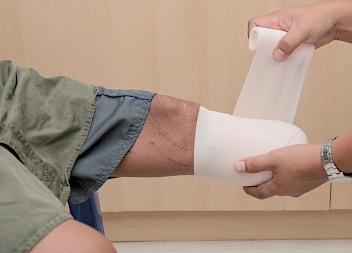Understanding Amputation and Medical Negligence
Amputation most commonly affects the legs, arms, hands, feet, fingers, or toes. When limb loss happens because of mistakes in medical care, it may give rise to an amputation medical negligence claim. Losing a limb can have a profound impact on mobility, independence, employment and emotional wellbeing. Adjusting to life after an amputation often takes significant physical and psychological strength.
When Does Medical Negligence Leading to Amputation Occur?
An amputation compensation claim can be brought if an amputation has occurred because of mistakes in diagnosis or treatment.
In supporting clients whose lives have been changed by avoidable limb loss, we have seen medical negligence leading to amputation arise from:
- Surgical Errors - An example of this would be operating on the wrong limb. This type of amputation negligence in hospital should not happen these days due to routine ‘marking up’ of patients before moving them to theatre. However, it is a surgical error that does still occur from time to time.
- A failure of a doctor to recognise that there is reduced blood supply to a patient’s limb - If a doctor fails to recognise a reduced blood supply to a patient’s limb, this can lead to amputation. A reduced blood supply could be caused by Compartment Syndrome, where there’s an increase in pressure within an enclosed muscle compartment. It could also be caused by a medical error, such as a cannula being placed into an artery rather than a vein. Or, it can be a result of a blood clot forming. For example, a blood clot at the back of the knee may block circulation to the foot. Failure to recognise this and operate may result in loss of the lower limb. This happened to our client, an 89-year-old war Veteran, who lost his leg and subsequently received £150,000 in amputation negligence claims.
- Failure to refer a patient for surgery in time to avoid amputation - If your GP fails to recognise a vulnerable limb and, subsequently, fails to refer you to a surgeon in time, they can be liable for amputation negligence. This happened to our client; his GP failed to recognise that his foot was pale, cold and pulseless and should have referred him immediately to a hospital vascular surgeon.
- Failure to recognise and diagnose an infection - Infections, such as sepsis, osteomyelitis and cellulitis can cause blood clots and gangrene. If this is not properly recognised, diagnosed and treated by a medical professional, it can lead to amputation.
- Poor diabetic care - Toe or foot ulcers are more likely to develop in diabetic patients. When a toe or foot ulcer has not been treated adequately by a GP or nurse, it can lead to gangrene and amputation due to medical negligence. Diabetic patients are also more susceptible to developing Charcot Foot, which, with missed diagnosis, can lead to amputation.
- Untreated pressure sores - If pressure sores are not noticed and treated quickly by medical professionals, they can deepen from Grade 1 to Grade 4, leading to sepsis and, at times, amputation. This is exactly what happened to our client who had suffered a stroke and was in hospital. He was also a diabetic with reduced sensation in his feet. Nurses did not notice a pressure sore developing on his heel. This ultimately led to a deep-seated infection in the foot. Sadly, this went too far and he had no choice but to have amputation of his one remaining leg.
What are the most common types of amputation caused by medical negligence?
There is no one type of amputation negligence claim that is most common. Any of the reasons for amputation listed above could be caused by medical negligence, to which you may be able to make a medical amputation claim. Get in touch with our specialist amputation lawyers who can discuss your potential claim with you.
Why choose Medical Solicitors for your medical amputation claim?
At Medical Solicitors, we understand the mental and physical trauma that losing a limb can cause. We will treat your case with the utmost sensitivity, and we are happy to meet you in your own home if this is most comfortable for you. Ultimately, we're here to support you through what is understandably a difficult time.
With decades of experience handling medical amputation claims and a track record of success with amputation cases, we do whatever it takes to help our clients win the loss of limb compensation they deserve.
FAQ's About Amputation Claims and Compensation
-
Can I make an amputation claim?
Yes, if you believe your amputation could have been avoided with proper medical diagnosis and treatment, then you may have grounds to make an amputation claim.
-
How long do I have to make an amputation negligence claim?
There are time limits in place when it comes to making amputation claims, which is why it’s important to seek advice from a specialist medical negligence amputation solicitor as soon as possible. Typically, you must make your claim within 3 years of the incident occurring, or 3 years from the date you became aware that your injury was due to negligence. However, it is possible to bring a claim out of time, so please still speak to us as every case is judged on its own facts. See our advice on time limits and extending them here.
-
How much does it cost to make an amputation claim?
At Medical Solicitors, we offer free, no obligation legal advice throughout the whole process. If you’re happy with the progress we’re making with your amputation negligence claim, we will offer you a No Win No Fee agreement. This means that if your medical amputation claim is unsuccessful, you don’t pay us any fees. Find out more about our complete process.
-
What can be claimed in compensation for amputation?
The aim of loss of limb compensation is to try and put you back in the position you were before your injury, as far as possible. That is, to make it possible for you and your loved ones to continue living in your home and carry on with your previous lifestyle. With this in mind, here are factors that should be considered when calculating your medical amputation claim:
-
Time off work - Amputee patients can suffer devastating financial losses, such as loss of earnings because of time off work. This can also impact a patient’s pension. In addition, a family member or friend may have to give up work to become a full-time carer.
-
Adapting your home - Most of us live in homes with stairs which can pose particular difficulties, especially if there is only a bathroom and toilet on one floor. It is often impossible to meet bills for adaptations to a home and also to pay for specialist equipment that’s badly needed.
-
Support and rehabilitation - Adjusting to life without a limb can be significantly challenging, causing strain on both your physical and mental health. You may need amputation compensation for extra help and support at home. Plus, you may need to cover private rehabilitation, therapy and medical expenses. If you experience phantom pain – pain that feels as though it’s coming from the amputated limb – you may also benefit from treatments that combat this pain.
-
Prosthetic limbs - Artificial limbs and equipment provided by the NHS or social services are often inadequate. This can apply particularly for children and patients who previously led a very active life. If you are wealthy, then you will be able to purchase private prosthetics. However, such things are very costly and beyond the reach of most people. Private prosthetics offer more sophisticated artificial limbs with various options for different activities. Such options can help a patient to continue their previous hobbies and work activities. Examples of this include our Paralympians who benefit from the most sophisticated prosthetics.
-
How much compensation will I receive?
Amputation claims often settle for very high sums indeed. If your medical amputation claim is successful, the amount of compensation you will receive depends on the severity of your injury and how much impact the injury has on your lifestyle. Your claim should cover the factors listed above if they apply to you. To discuss the potential of your amputation claim, please contact our specialist amputation solicitors.
-
Can I get compensation before my amputation claim is settled?
It can take time for a medical amputation claim to be settled, and we’ll help you decide if interim payments are suitable for you. An interim payment is a part payment on account of your compensation, which would be provided to you ahead of your final settlement. You are only able to request interim payments if the other party admits liability and, as your solicitor, we would request the interim payment for you.
Contact Medical Solicitors today
If you belive you have an amputation negligence claim, please get in touch with our friendly team today. You can submit an enquiry online, call us on 01142 507100 or email help@medical-solicitors.com.
Please Note: At Medical Solicitors, we specialise in handling amputation and limb loss cases involving healthcare providers in England and Wales and will be happy to extend a helping hand if your case is based in either of these regions. Unfortunately, we do not attend to amputation negligence claims outside of England and Wales.













